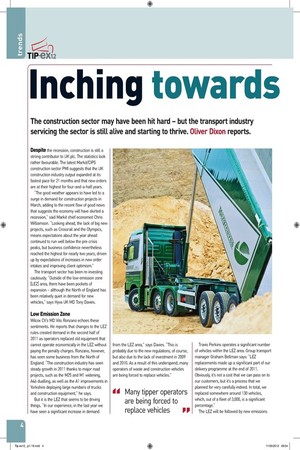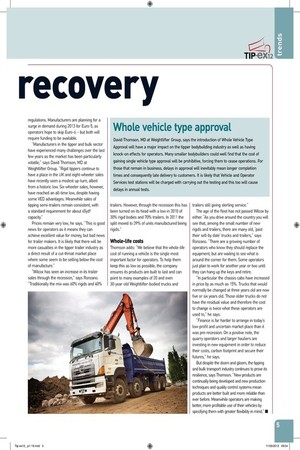Inching towards
Page 3

Page 4

If you've noticed an error in this article please click here to report it so we can fix it.
recovery The construction sector may have been hit hard - but the transport industry servicing the sector is still alive and starting to thrive. Oliver Dixon reports.
Despite the recession, construction is still a strong contributor to UK plc. The statistics look rather favourable. The latest Markit/CIPS construction sector PMI suggests that the UK construction industry output expanded at its fastest pace for 21 months and that new orders are at their highest for four-and-a-half years.
The good weather appears to have led to a surge in demand for construction projects in March, adding to the recent flow of good news that suggests the economy will have skirted a recession," said Markit chief economist Chris Williamson. "Looking ahead, the lack of big new projects, such as Crossrail and the Olympics, means expectations about the year ahead continued to run well below the pre-crisis peaks, but business confidence nevertheless reached the highest for nearly two years, driven up by expectations of increases in new order intakes and improving client optimism."
The transport sector has been re-investing cautiously. "Outside of the low-emission zone [LEZ] area, there have been pockets of expansion - although the North of England has been relatively quiet in demand for new vehicles," says Hyva UK MD Tony Davies.
Low Emission Zone Wilcox CV's MD Vito Ronzano echoes these sentiments. He reports that changes to the LEZ rules created demand in the second half of 2011 as operators replaced old equipment that cannot operate economically in the LEZ without paying the penalty charges. Ronzano, however, has seen some business from the North of England. The construction industry has seen steady growth in 2011 thanks to major road projects, such as the M25 and M1 widening, 446 dualling, as well as the Al improvements in Yorkshire deploying large numbers of trucks and construction equipment," he says.
But it is the LEZ that seems to be driving things. In our experience, in the last year we have seen a significant increase in demand from the LEZ area," says Davies. This is probably due to the new regulations, of course, but also due to the lack of investment in 2009 and 2010. As a result of this underspend, many operators of waste and construction vehicles are being forced to replace vehicles."
Travis Perkins operates a significant number of vehicles within the LEZ area. Group transport manager Graham Bellman says: "LEZ replacements made up a significant part of our delivery programme at the end of 2011. Obviously, its not a cost that we can pass on to our customers, but its a process that we planned for very carefully indeed. In total, we replaced somewhere around 130 vehicles, which, out of a fleet of 3,000, is a significant percentage."
The LEZ will be followed by new emissions regulations. Manufacturers are planning for a surge in demand during 2013 for Euro-5, as operators hope to skip Euro-6 - but both will require funding to be available.
"Manufacturers in the tipper and bulk sector have experienced many challenges over the last few years as the market has been particularly volatile," says David Thomson, MD at Weightlifter Group. "Rigid tippers continue to have a place in the UK and eight-wheeler sales have recently seen a modest up-turn, albeit from a historic low. Six-wheeler sales, however, have reached an all-time low, despite having some VED advantages. Meanwhile sales of tipping semi-trailers remain consistent, with a standard requirement for about 65yd3 capacity."
Prices remain very low, he says. This is good news for operators as it means they can achieve excellent value for money, but bad news for trailer makers. It is likely that there will be more casualties in the tipper trailer industry as a direct result of a cut-throat market place where some seem to be selling below the cost of manufacture."
"Wilcox has seen an increase in its trailer sales through the recession," says Ronzano. "Traditionally the mix was 60% rigids and 40% trailers. However, through the recession this has been turned on its head with a low in 2010 of 30% rigid bodies and 70% trailers. In 2011 the split moved to 39% of units manufactured being rigids."
Whole-Life costs Thomson adds: We believe that the whole-life cost of running a vehicle is the single most important factor for operators. To help them keep this as low as possible, the company ensures its products are built to last and can point to many examples of 20 and even 30-year-old Weightlifter-bodied trucks and trailers still giving sterling service."
The age of the fleet has not passed Wilcox by either. As you drive around the country you will see that, among the small number of new rigids and trailers, there are many old, 'past their sell-by date trucks and trailers," says Ronzano. "There are a growing number of operators who know they should replace the equipment, but are waiting to see what is around the corner for them. Some operators just plan to work for another year or two until they can hang up the keys and retire.
In particular the chassis cabs have increased in price by as much as 15%. Trucks that would normally be changed at three years old are now five or six years old. Those older trucks do not have the residual value and therefore the cost to change is twice what these operators are used to," he says.
"Finance is far harder to arrange in today's low-profit and uncertain market place than it was pre-recession. On a positive note, the quarry operators and larger hauliers are investing in new equipment in order to reduce their costs, carbon footprint and secure their futures," he says.
But despite the doom and gloom, the tipping and bulk transport industry continues to prove its resilience, says Thomson. New products are continually being developed and new production techniques and quality control systems mean products are better built and more reliable than ever before. Meanwhile operators are making better, more profitable use of their vehicles by specifying them with greater flexibility in mind." •



























